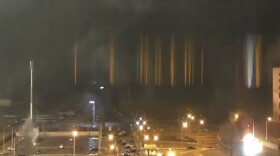
Lauren Frayer
Lauren Frayer covers India for NPR News. In June 2018, she opened a new NPR bureau in India's biggest city, its financial center, and the heart of Bollywood—Mumbai.
Before moving to India, Lauren was a regular freelance contributor to NPR for seven years, based in Madrid. During that time, she substituted for NPR bureau chiefs in Seoul, London, Istanbul, Islamabad, and Jerusalem. She also served as a guest host of Weekend Edition Sunday.
In Europe, Lauren chronicled the economic crisis in Spain & Portugal, where youth unemployment spiked above 50%. She profiled a Portuguese opera singer-turned protest leader, and a 90-year-old survivor of the Spanish Civil War, exhuming her father's remains from a 1930s-era mass grave. From Paris, Lauren reported live on NPR's Morning Edition, as French police moved in on the Charlie Hebdo terror suspects. In the fall of 2015, Lauren spent nearly two months covering the flow of migrants & refugees across Hungary & the Balkans – and profiled a Syrian rapper among them. She interviewed a Holocaust survivor who owed his life to one kind stranger, and managed to get a rare interview with the Dutch far-right leader Geert Wilders – by sticking her microphone between his bodyguards in the Hague.
Farther afield, she introduced NPR listeners to a Pakistani TV evangelist, a Palestinian surfer girl in Gaza, and K-pop performers campaigning in South Korea's presidential election.
Lauren has also contributed to The New York Times, the Los Angeles Times, and the BBC.
Her international career began in the Middle East, where she was an editor on the Associated Press' Middle East regional desk in Cairo, and covered the 2006 Israel-Hezbollah war in Syria and southern Lebanon. In 2007, she spent a year embedded with U.S. troops in Iraq, an assignment for which the AP nominated her and her colleagues for a Pulitzer Prize.
On a break from journalism, Lauren drove a Land Rover across Africa for a year, from Cairo to Cape Town, sleeping in a tent on the car's roof. She once made the front page of a Pakistani newspaper, simply for being a woman commuting to work in Islamabad on a bicycle.
Born and raised in a suburb of New York City, Lauren holds a bachelor's degree in philosophy from The College of William & Mary in Virginia. She speaks Spanish, Portuguese, rusty French and Arabic, and is now learning Hindi.
-
India's Hindu nationalists say they've drastically cut crime in Uttar Pradesh, where key elections are underway. Human rights advocates say there's been a spike in police brutality against minorities.
-
The head of the U.N. atomic watchdog says there was no release of radioactive material after a projectile hit a building at the plant facility.
-
Lahiri famously brought a disco vibe to India's biggest film industry. He composed dozens of hits in the 1970s and '80s — which appeared in many top Bollywood movies.
-
Women's groups have petitioned the Delhi High Court to close a legal loophole and criminalize marital rape. A decision is expected soon. Men who oppose the petitions have gone on a "marriage strike."
-
When you think of India, you might think of heat and humidity before snow. But India is home to parts of the Himalayan mountains. That's where Olympian Arif Khan first put on skis.
-
India's COVID-19 caseload is quickly rising, as omicron threatens the country's already precarious health system.
-
The Indian government says it has refused to renew a permit that allows the Missionaries of Charity to use foreign funds to operate orphanages and hospices across the country.
-
Health experts worldwide are warning that the battle against the Omicron variant is far from over. Three NPR correspondents provide the latest on the pandemic from Europe and South Asia.
-
Bangladesh has gone from what U.S. diplomats called a "basket case" to a rising economy in Asia. The IMF says its GDP may soon exceed Denmark's and Singapore's.
-
India's Rabindranath Tagore was the first nonwhite writer to win the Nobel Prize in literature. His 1892 story, "The Kabuliwala," fostered empathy for migrants and refugees. It still resonates today.








